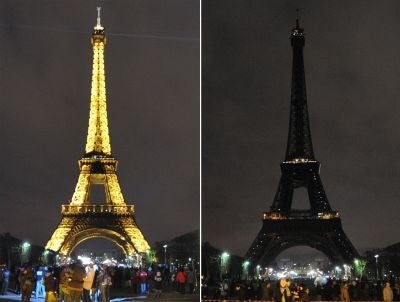Your support helps us to tell the story
From reproductive rights to climate change to Big Tech, The Independent is on the ground when the story is developing. Whether it's investigating the financials of Elon Musk's pro-Trump PAC or producing our latest documentary, 'The A Word', which shines a light on the American women fighting for reproductive rights, we know how important it is to parse out the facts from the messaging.
At such a critical moment in US history, we need reporters on the ground. Your donation allows us to keep sending journalists to speak to both sides of the story.
The Independent is trusted by Americans across the entire political spectrum. And unlike many other quality news outlets, we choose not to lock Americans out of our reporting and analysis with paywalls. We believe quality journalism should be available to everyone, paid for by those who can afford it.
Your support makes all the difference.Lights went off around the world Saturday as landmark buildings and ordinary homes flipped their switches while the annual "Earth Hour" circled the planet in what was dubbed the world's largest voluntary action for the environment.
In Paris a minute's silence was observed for Japan as the city of light went dark, with illuminations switched off at the Eiffel Tower, Notre Dame cathedral, City Hall, opera houses and many bridges, fountains and public places.
Sydney's Opera House was the first of many global landmarks to go dark as the event got under way, as hundreds of millions of people prepared to follow suit to enhance awareness of energy use and climate change.
Others in their turn included Beijing's "Bird's Nest" stadium that hosted the 2008 Olympics, the London Eye ferris wheel, Times Square in New York and Brazil's Christ the Redeemer statue.
Many switched off their floodlighting, advertising signs and other illuminations for an hour from 8:30 pm local time.
"The amount of power that's saved during that time is not really what it's about," Earth Hour co-founder and executive director Andy Ridley told AFP in Sydney, where the movement began in 2007.
"What it is meant to be about is showing what can happen when people come together."
Ridley said a record 134 countries or territories were on board for this year's event.
Organizers also asked people to commit to an action, large or small, that they will carry through the year to help the planet.
Ridley said Earth Hour, organized by global environment group WWF, this year would also focus on connecting people online so they could inspire each other to make commitments to help protect the environment.
In Australia, organizers said an estimated 10 million people, nearly half the population, took part, with Sydney Harbour Bridge another of the landmarks to go dark.
Hong Kong's neon waterfront dimmed, while in Singapore all decorative lights were switched off and non-critical operational lights lowered at Changi Airport for an hour.
In Japan, which is reeling from a huge earthquake and tsunami that struck this month, several thousand people and a hotel-turned-evacuation center in the northeast marked Earth Hour.
In Russia some 30 cities joined in, from Petropavlovsk-Kamchatsky, the most easterly city on the Kamchatka peninsula, through Moscow to Murmansk in the far north.
Moscow turned off floodlighting on more than 70 buildings and bridges, including the 540-meter (1,780-foot) television tower and the 32-storey Moscow State University building.
In Athens monuments being darkened included the Acropolis, the parliament building, the presidential palace and the temple of Poseidon near the city.
In Italy, more than 200 towns and cities took part. The Ponte Vecchio in Florence, the Tower of Pisa and the Colosseum in Rome all turned off their lights for an hour.
Lights went out in 52 Romanian cities, where concerts and candle-light marches were organized. In Bucharest, dozens of people cycled through the city center before gathering in George Enescu square.
In the United States, parts of Boston's and Chicago's skyline turned dark as many buildings joined the event.
The participating landmarks in Chicago included the Merchandise Mart, Wrigley Building, NBC tower, Chicago Theater and Navy Pier among others.
At Los Angeles International Airport, tall gateway pylons that glowed solid green just before the event went dark. The pylons now use special light fixtures that consume 75 percent less electricity than the previous lamps.
The historic Long Beach hotel Queen Mary turned off its exterior lights and guests had been asked to turn off their nonessential stateroom lights.
Also dark was the famous Ferris wheel on Santa Monica's pier.
In Argentina, Buenos Aires switched off the spotlight on its landmark Obelisk.
In South Africa the Grammy award winning group Soweto Gospel choir along with other local musicians treated hundreds of people to a free candlelight concert in the township of Soweto. Music fans waved lit candles while others used their cellphones to light up the stage.
UN Secretary General Ban Ki-moon backed Earth Hour, urging people to celebrate the shared quest to "protect the planet and ensure human well-being."
"Let us use 60 minutes of darkness to help the world see the light," he said.
Ridley said he never expected the Earth Hour movement to become so large.
"We didn't imagine right at the beginning... it would be on the scale that it is now. And the fact that it is so cross cultural, beyond borders and race and religion," he said.

Join our commenting forum
Join thought-provoking conversations, follow other Independent readers and see their replies
Comments